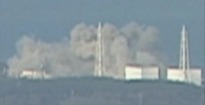Reactor Crew Let Pressure Build
 The Wall Street Journal reports:
The Wall Street Journal reports:
TOKYO—The operator of Japan's stricken nuclear plant let pressure in one reactor climb far beyond the level the facility was designed to withstand, a decision that may have worsened the world's most serious nuclear accident in a quarter century.
Japanese nuclear-power companies are so leery of releasing radiation into the atmosphere that their rules call for waiting much longer and obtaining many more sign-offs than U.S. counterparts before venting the potentially dangerous steam that builds up as reactors overheat, a Wall Street Journal inquiry found.
Japan's venting policy got its first real-world test in the chaotic hours after March 11's earthquake and tsunami knocked out cooling systems at the Fukushima Daiichi nuclear-power complex. By the first hours of March 12, an emergency was brewing inside the plant's No. 1 reactor.
By around 2:30 a.m., the pressure inside the vessel that forms a protective bulb around the reactor's core reached twice the level it was designed to withstand. Amid delays and technical difficulties, it was another 12 hours before workers finished releasing radioactive steam from this containment vessel, via reinforced pipes, to the air beyond the reactor building.
About an hour later, the reactor building itself exploded—a blast that Japanese and U.S. regulators have since said spread highly radioactive debris beyond the plant. The explosion, along with others amid overheating at reactors 2, 3 and 4, contributed to radiation levels that led to mandatory evacuations around the plant and the government's admission that the Fukushima Daiichi disaster ranks alongside Chernobyl at the top of the nuclear-disaster scale.
Experts in the U.S. and Japan believe the venting delay may have helped create conditions that led to the blast. In one possible scenario, pressure built so high that it damaged gaskets and other parts of the venting system, through which highly explosive hydrogen gas leaked from the core into the reactor building. It was Japan's cautious approach to venting, an outgrowth of its profound concern over nuclear contamination, that may well have made the accident worse, they say.
Tokyo Electric Power Co. chief executive Masataka Shimizu defended his company's actions when asked in Parliament last week to explain the timing of venting at the plant, which Tepco operates.
"Venting means you're affecting the surrounding area," Mr. Shimizu said. "It was imperative we made completely certain that evacuation was taken care of for everyone affected."
Click here to read more.

